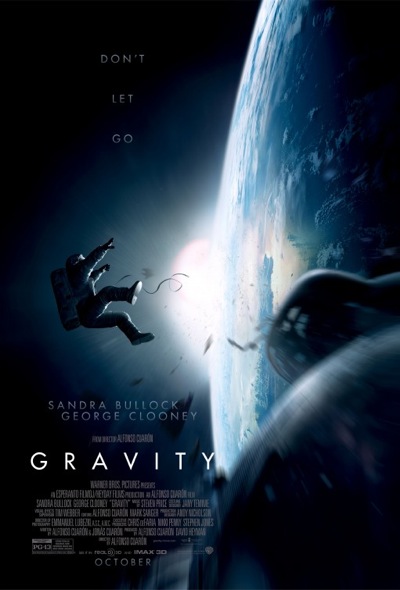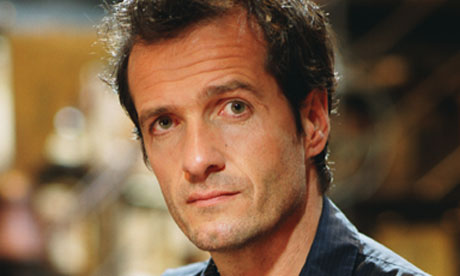
David Heyman comes from good movie-producing stock. His mother, Norma, was nominated for an Oscar as a producer on Stephen Frears's DANGEROUS LIASONS, while his father, John, helped bring 1979's JESUS to the big screen (which The New York Times estimates is the most-watched motion picture of all time). So it's only fitting he has gone on to have a massively successful producing career of his own, beginning in 1992 with Ernest Dickerson's JUICE, but really taking off when he purchased the rights to a popular series of YA novels in 1999. Though he shelled out a considerable $2 million for the books, his investment in J.K. Rowling's Harry Potter universe has paid off to the tune of $7.7 billion at the worldwide box office (and counting).
Of the many creative masterstrokes that kept the Potter film franchise viable for a solid decade, the decision to hire Alfonso Cuaron as director of the third installment, HARRY POTTER AND THE PRISONER OF AZKABAN, was easily the shrewdest and the riskiest. Though Cuaron had earned critical accolades for his adaptation of THE LITTLE PRINCESS, he was coming off of the ribald coming-of-age film Y TU MAMA TAMBIEN. Was this really the right guy to take the directorial reins from the family-friendly Chris Columbus. Of course he was. AZKABAN is not only the book that transitions its titular character into young adulthood, it also introduces a note of melancholy that resonates throughout the series. If Columbus gave the Potter franchise its heart, Cuaron imbued it with soul.
Nine years later, Heyman is gambling on Cuaron again, this time with the wholly original space adventure GRAVITY. Though the film has a little movie star insurance in Sandra Bullock and George Clooney, it's a rarity in today's event film landscape in that it isn't tied to a preexisting intellectual property. There's no brand to build off of here: just the promise of a one-of-a-kind cinematic experience. With audiences feeling 3D fatigue after too many shoddy or just plain unnecessary post-conversions, selling them on an "experience" is a dicey proposition. But Heyman knows he's got the goods, largely because he's got the filmmaker. When I chatted with Heyman at the GRAVITY press day, we talked about the challenge of developing an original project, the maturation of Alfonso Cuaron and, for the hell of it, one of his earlier producing efforts (Greg Mottola's gem of a comedy, THE DAYTRIPPERS).

Mr. Beaks: It's rare to encounter an event film that isn't backed up by a preexisting intellectual property.
David Heyman: So true. As someone who's been part of films that have had prior IP - the Harry Potter films, I AM LEGEND, even YES MAN - this is actually quite personal. Alfonso was coming to it at a time where he himself had been experiencing certain adversity in his life making CHILDREN OF MEN. That really was channelled into this film. But it's unusual on that front. It's unusual that you've got a woman lead in an action movie... one character alone for a huge portion of the film. It was very bold for them to say yes.
Beaks: On your end, how does that make things different from doing a Harry Potter film?
Heyman: It's not that different. You bring less of a loyal fan base to the table; you're not disappointing them or thrilling them with their prior knowledge, experience and familiarity with the original material. But it's the same. You're just trying to make the very best version of the story that you're trying to tell. When we were making Potter films, I never went on blogs to see what fans were saying. I was a fan, everybody who worked on it were fans, and we were just trying to make the best film possible. It's the same here: make the best film possible.
Beaks: There's been some disagreement as to whether this is a science-fiction film or not. What's your thinking on that?
Heyman: It's not really a science-fiction film. This isn't a story that's happened, so it's fiction, and there's certainly a lot of science involved in it, but the issue exists now. The spacecraft, the suits... everything is today. It's not the future. Often science-fiction is about the future, but this is today. The issue of space debris is a very real one. Just a couple of months ago, the ISS had to move because of a threat of debris collision. Actually, the ISS gets hit by little chunks of debris quite often. But everything that is left in space orbits the Earth at 17,000 mph, and if a satellite gets destroyed, we're in trouble. The danger is that it's getting worse and worse. If we get to a place where satellites are being affected, are we going to be able to send people and craft up into space? We're polluting our orbit. Just like on Earth, we're doing it up there, too.
Beaks: Having worked with Cuaron before, how would you say he has grown as a filmmaker?
Heyman: As a filmmaker, when he started work on [HARRY POTTER AND THE PRISONER OF AZKABAN], he didn't have much knowledge of visual effects. By the end of the film, he was a master. Alfonso is hungry for knowledge. He has a real appetite for learning. He's one of the smartest people I know, but he doesn't flaunt it. He's very casual and playful, but beneath that is an incredible heart and brain. His knowledge of every single aspect of the filmmaking process is remarkable. This, I think, is a more personal film. On Potter, the costumes... everything was tweaked by him. But [GRAVITY] emanated from a story conceived by him and his son, and came about at a time of great adversity for him. So how has he developed? He's more mature. I think he knows what matters more.
Beaks: You mentioned that Alfonso understands every aspect of the filmmaking process. This is rarely the case.
Heyman: David Yates came into [HARRY POTTER AND THE ORDER OF THE PHOENIX] and knew nothing about visual effects. It's important not to be a slave to visual effects, to have visual effects work for you and not you work for visual effects. I think it's okay if you've got people working in visual effects who know a great deal. On [GRAVITY], we had Tim Webber as our visual effects supervisor, and we had great people working on the Potter films. I think that is very important, but... it helps to have great knowledge of all aspects of filmmaking. It can only help. You're never hindered by it. And I think Alfonso's knowledge of light, editing, music as well as narrative and performance can only help enhance the experience. With something like this, in which all of those elements come together in such a profound way... this is not a film that can be cut after the fact. This is a film that was conceived the way that it turned out; this is his vision through and through. You need that sort of mind.
Beaks: One of the film's great virtues is that it is ninety minutes.
Heyman: When we were having initial budget conversations with the studio, ninety minutes was how we were figuring out the budget in part. You're paying by second, by minute in visual effects, so we determined what that would be, and when shooting it expanded a little bit. It was a little bit longer, but it came down for no other reason than to make the story leaner and tighter, and getting to the truth of the character in a better, more efficient way. Actually, one of the things that Jonas [Cuaron], who was an integral part of the process, would say is to tear away the extraneous.
Beaks: It's rare to get a film of this scope that is so light on exposition.
Heyman: There were discussions about that. That was something that Alfonso really wanted: a story that exists in the present. That's one of the reasons we don't go down to Mission Control: it's in the moment, it's existential, it's right here. She goes on a journey where she's numb and almost dead and not connecting with people and life because of something that happened in her past. But really the journey is in the present.
Beaks: Do you think films rely too much on exposition?
Heyman: Yes. I think that's a product of development. "Why do people do things?" It's okay to ask that question, but the answer doesn't have to be "When they were six, they were hit by their mother, and when they were eighteen they broke up with the boyfriend or girlfriend." You don't have to be that literal.
Beaks: You were an executive producer on one of my favorite independent comedies of the '90s: THE DAYTRIPPERS. What are your memories of working on such a small scale with Greg Mottola on that film?
Heyman: I was brought onto that film by Nancy Tenenbaum, who had been working with Greg for a long time trying to get a film made. So Greg conceived of a film that he could make for nothing. There were five investors in the film, and we each put in... I think it ended up being $12,000: myself, Steven Soderbergh, Nancy Tenenbaum, James Brooks and maybe Campbell Scott. We conceived of a film that could be made for that price, and that's what we shot it for. It cost more to complete it, there were deferments if we got distribution, but that's how we did it. It was just really fun. It was a can-do attitude without anyone telling us what to do. No one was guiding us, which is a rare experience. Greg is just a really good director. He really searches out the truth and emotion of a piece, and I really enjoyed that time.
You should certainly seek out THE DAYTRIPPERS, but right now you need to book your IMAX 3D flight for GRAVITY, which is in theaters now.
Faithfully submitted,
Mr. Beaks
